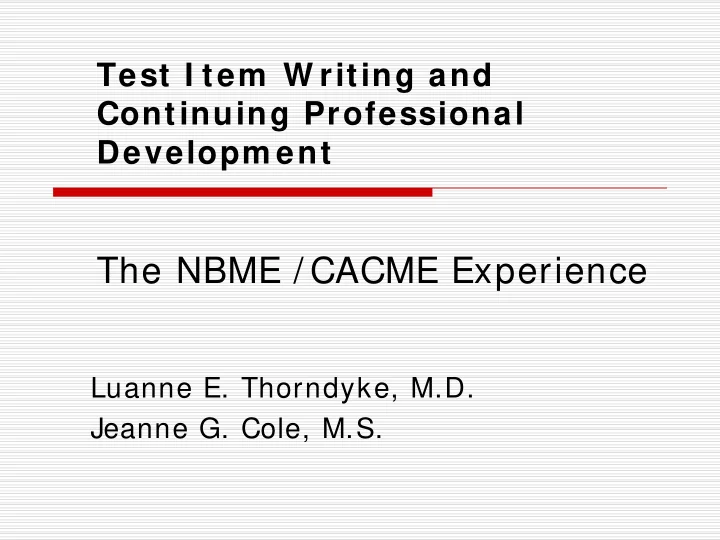

Test I tem W riting and Continuing Professional Developm ent The NBME / CACME Experience Luanne E. Thorndyke, M.D. Jeanne G. Cole, M.S.
Background � The National Board of Medical Examiners (NBME) and the Consortium for Academic CME (CACME) developed a CME activity centered on item writing for the NBME � We hypothesized that this experience would enhance professional performance beyond acquisition of skill in test item writing
NBME Item Writing CME Program � I tem -w riting W orkshop � I ndependent Study � Assess learning needs � Implement methods to address gaps � Develop test questions � Peer Review / Group Discussion � Evaluation � Quantitative and Qualitative Survey � Up to 50 Category I credits available
Purpose of Pilot Study � To identify the relationship between test item writing for the NBME and continuing professional development � To explore the impact of item writing on professional responsibilities and performance, especially clinical skills and teaching
Methods – Qualitative Approach � Study population � Participants of NBME Item Writing Workshop who were subsequently assigned to an NBME Committee � 3 years (2002, 2003, 2004) � Survey of 5 open ended questions
Qualitative analysis � Identify major themes through iterative readings � Responses grouped to refine themes � Apply codes to represent data elements embedded in responses � A response could be coded in multiple categories � Coding taxonomies finalized through consensus among coders � Examples selected to illustrate themes
Results � 89 NBME Committees over 3 yrs � n = 602/ 809 (74.4% ) � Overall participant satisfaction with the activity was very high � Average credit claimed: 42 � Data themes consistent over 3 years
Participants reported the activity improved � Medical knowledge base � Clinical thought processes � Skills in teaching and assessing learners � Content expertise � Skill of test item writing
Impact on Clinical Skills Expanded fund of knowledge 10-44% Maintained/ updated knowledge � Within specialty 18-38% � Outside of specialty 15-22% Improved clinical thought processes 11-18% Improved clinical diagnosis 1-11% 2-16% Broadened perspective on clinical problems
Improvements in Teaching and Assessment Skills Knowledge base for teaching 8-21% Understanding different levels of 16-21% learners Teaching methods 4-23% Ability to prioritize medical content 4-17% Assessment skills 6-16% Understanding of the 1-19% teaching/ learning process
Improvements in item writing abilities Clarity and precision 25-30% Structure and format of questions 10-19% Efficiency of writing 5-15% Writing skills 2-30% Integration knowledge & reasoning 1- 9% Decreased ambiguity of questions 5-11%
Impact of Peer Review on the Educational Process Outstanding! Superb! 30-67% Peer Learning/ Shared Learning 15-41% Effective learning process 8-21% Feedback/ Peer Review 3-13% Broader exposure 9-18%
Impact on Content Expertise Enhanced knowledge base 27-52% Expanded content expertise 25-36% Stimulated independent learning 13-16% Improved educator/ item-writer 11-29% Modest/ minimal impact 2-11%
Quotable Quotes… � This is the most useful CME that I do. � Some of the best, most effective learning that I have ever participated in. � I believe that this is an extremely useful process for my personal education and growth. � In my job as a teacher of medical students, it was priceless. � It is a very intense learning experience… this creates a broader learning experience than our usual CME experiences… and helps us to become more well-rounded, which ultimately helps patients.
Conclusions � The NBME Item Writing experience is a valuable professional development activity � Self-assessed improvements occurred in � teaching and assessment skills � writing skills (beyond test item writing) � integrative functions � clinical knowledge and expertise � content-specific expertise � clinical thought processes � The peer-review process is a critical learning component of this experience
Conclusions � This pilot advances our understanding of the impact of one educational activity on other areas of professional responsibility � Based on this pilot, further research should be undertaken
Acknowledgements � CACME � Penn State College of Medicine � Tracy Allgier-Baker, Dennis Lott � Temple University School of Medicine � Robert Smedley, Catherine Thomas-King � Jefferson Medical College � Timothy Brigham, Geno Merli, Joseph Seltzer � University of Pittsburgh School of Medicine � Barbara Barnes, Rebecca Zukowski � NBME � Denise Muschamp, Peter Scoles
Five Open Ended Questions 1. How do you perceive the impact of the test writing experience in improving your clinical skills and practice of medicine? 2. … on your work teaching and assessing medical students and/ or residents? 3. What improvements have you noted in your own item writing abilities as a result of this experience? 4 . How would you evaluate the peer review experience on the educational process? 5. What impact could this process have on your content expertise?
Recommend
More recommend